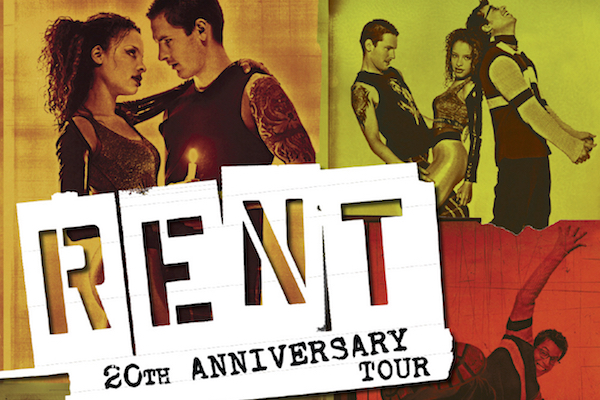
Twenty years on, 'Rent' reminds us that class economics, AIDS, and addiction persist
By Tina Farmer
The Fox Theatre brings the twentieth anniversary tour of Rent to St. Louis in a production that is vocally near perfection, with themes that resonate to contemporary audiences. The show remains firmly in the 1990s, so the styles are a bit dated, but that doesn't lessen the impact of the story. Since the musical liberally references the operas La Boehme and Les Miserable, it's clear the issues of class, poverty, the struggle of artists, disease, and addiction persist in society.
In the 1990s version of the story, we are introduced to close friends Mark, an aspiring filmmaker, Roger, an aspiring songwriter and musician, and Tom Collins, a brilliant scholar and computer hacker who eschews the comforts of conventional academia. The three live in a run down building inhabited by other artists and addicts, in a section of New York City that was once friendly to the homeless and struggling but is undergoing gentrification.
Mark pines over Maureen, a bisexual performance artist who loves nothing as much as the spotlight. Rogers longs to free himself from depression brought on by the loss of his former girlfriend, perhaps neighbor Mimi can help him find the will to live and love again. Tom Collins was recently rescued, physically and emotionally, by the transgender Angel. They are all angry with their friend Benjamin for marrying and callously promoting gentrification at the expense of his friends and the homeless. There's a class battle raging in this story and, as often the case in life, you're never really certain that anyone wins in the end.
Danny Harris Kornfeld is authentically nerdy and likable as filmmaker Mark Cohen. He's eager to be a part of the community, but hesitant to step from behind the camera and expose himself. Kaleb Wells is moody and emotionally transparent as Roger Davis, we see the conflict of confusion, desire, and despair in every movement and expression. He and Skyler Volpe, as the equally desperate Mimi Marquez, have chemistry that jumps from the stage and they dance and tease and fall into confused love with each other in a way that's palpable and satisfying. Aaron Harrington, as Tom Collins, and David Merino, as Angel Schunard, have the same intense chemistry.
Angel is the spiritual center of the show, representing hope and persistence, two qualities often missing in contemporary society. Merino effortlessly inhabits the character, radiating positive energy that spills from the stage. Wells and Volpe remind us of the beauty and pain that accompanies love, and the strength it provides in the most dire and unpromising of situations. Kornfeld is earnest, his narration and description as perceptive as his camera, and his voice has a pleasant everyman quality that engenders sympathy and belief. The story feels real when voiced by these actors, and the songs easily provide the dialogue in a year of change.
The supporting cast is strong as well, and features Christian Thompson as Benjamin Coffin III, Jasmine Easler as Joanne Jefferson, and Katie LaMark as Maureen Johnson, as well as Natalie Lipin, Bryson Bruce, Alia Hodge, Sammy Ferber, Jordan Long, Timothy McNeill, and Futaba Shioda. Thompson reminds me a bit of a young Drake and is irritatingly convincing as a man willing to step on others, albeit however lightly, to move up. His generosity and good-natured spirit help redeem him, and Thompson plays well against the others. Easler and LaMark were a bit problematic for me. I wanted to embrace their characters but each, at times, seemed to be in a different production. Easler came across as stridently dramatic while LaMark offered too much Broadway sunshine to really mesh with the rest of the cast. The choices suit the characters, but I wish director Evan Ensign had pushed the two a little further so their antagonistic moments weren't quite so transparent.
Rent is a fresh take on a centuries old story, as such, there's much familiar in the structure and plot. The updated setting and issues work well in the framework, the characters are genuinely compelling, and the songs are at times brilliantly simple, at times deliciously complex, and always sung to near perfection. The use of scaffolding, folding chairs, and industrial metal tables, works well to create a sense of industrial loft living on a lower economic scale.
I have come to realize that sustained notes and extended runs are the aria of modern musical theater, and to appreciate layered melodies and intricate structural refrains that create the sense of dialogue. Rent makes spectacular use of these devices and the cast is superb in their execution, knowing the music well enough to stretch it here and there to suit the individual voices. Davis, Johnson, and Hodge make the most of this with growls, jumps, and intonation that adds a fresh twist to familiar songs.
What leaves me wanting is the sense of connection and real struggle the show intends to reflect. This Rent is almost too perfect, even while it is understood that theater is necessarily hyper-real in its artistic interpretation of time, place, and fashion. The characters look too comfortable, things come too easy -- I was hoping for more gratitude and relief at the sight of money and food. The show is beautiful and compelling, with characters that truly captivate my attention, but it all feels a little shallow, taking me out of the moment at times.
Rent, running at the fabulous Fox Theatre through May 21, 2017, is a fitting update on classic themes and a thoroughly enjoyable evening of theater with a story that touches the heart and songs that will likely have you humming for several days to come. The characters feel real and it's easy to imagine the battles and choices they face, creating a show that naturally compels you to pay attention.


